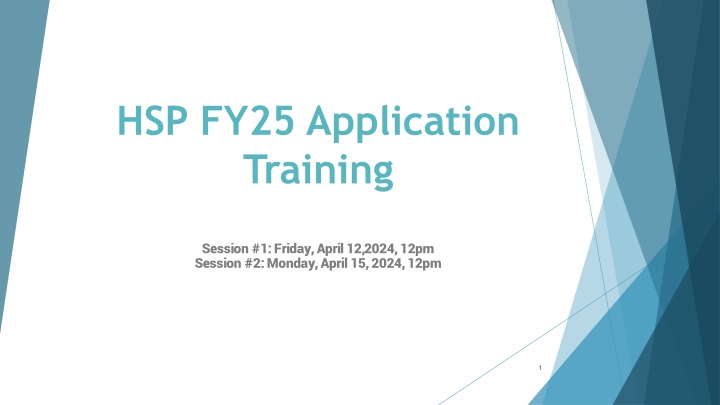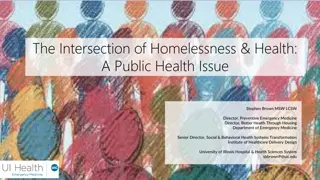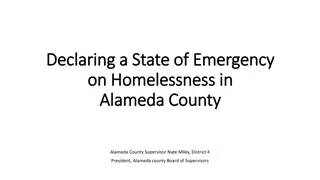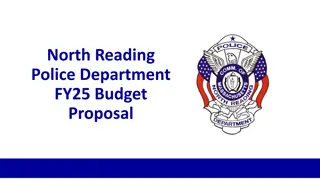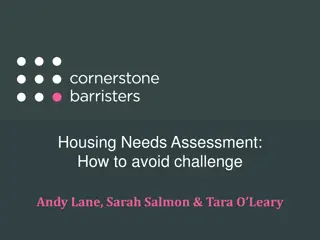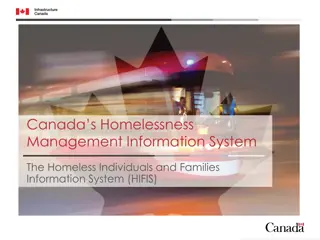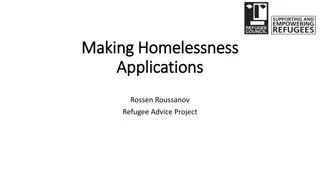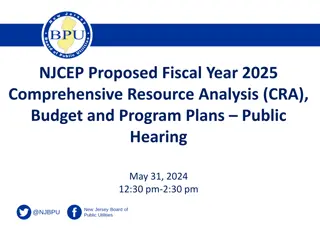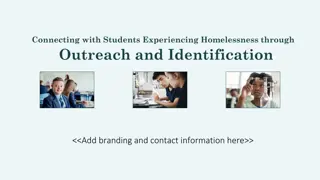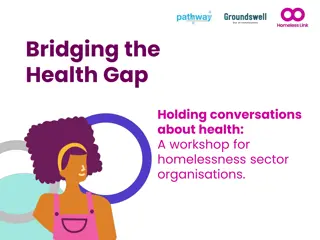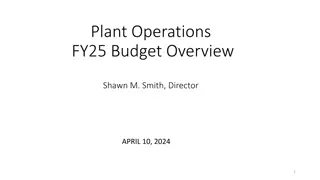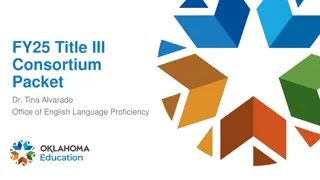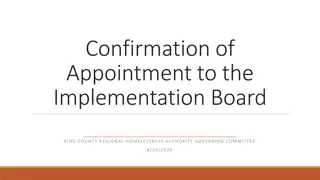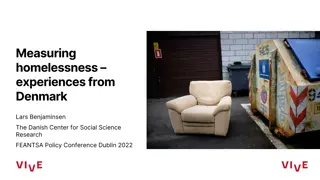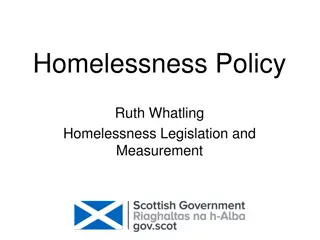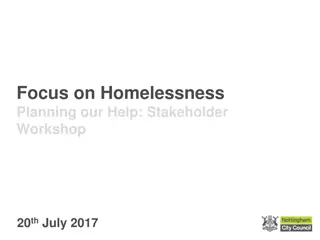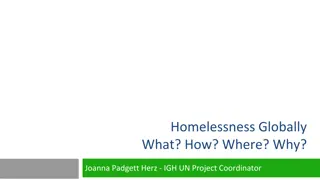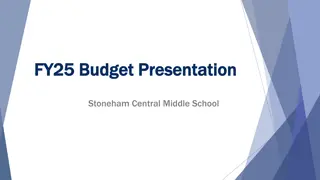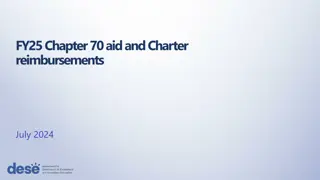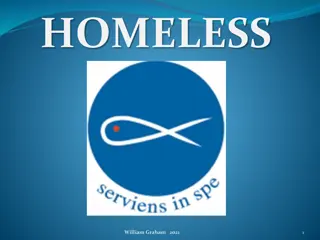Homelessness Solutions Program FY25 Funding Overview
DHCD's Homelessness Solutions Program in Maryland leads efforts to prevent and end homelessness by prioritizing funding for innovative projects, connecting individuals with housing, and serving vulnerable populations. Expected funding availability for FY25 includes a minimum of $1 million for unaccompanied youth projects. Funding priorities for FY25 emphasize transparency, competitive project selection, and budget allocation for rapid rehousing and permanent supportive housing. Changes in FY25 allow project-based leasing and rental assistance costs. View details on funding allocation and priorities in the provided text.
Download Presentation

Please find below an Image/Link to download the presentation.
The content on the website is provided AS IS for your information and personal use only. It may not be sold, licensed, or shared on other websites without obtaining consent from the author.If you encounter any issues during the download, it is possible that the publisher has removed the file from their server.
You are allowed to download the files provided on this website for personal or commercial use, subject to the condition that they are used lawfully. All files are the property of their respective owners.
The content on the website is provided AS IS for your information and personal use only. It may not be sold, licensed, or shared on other websites without obtaining consent from the author.
E N D
Presentation Transcript
HSP FY25 Application Training Session #1: Friday, April 12,2024, 12pm Session #2: Monday, April 15, 2024, 12pm 1
Homelessness Solutions Program Maryland DHCD sDivision of Homeless Solutions leads the state s strategy, policy, and coordinated response effort to prevent and end homelessness. This includes administering the Homelessness Solutions Program (HSP), which provides over $15 million in annual funding to Continuums of Care (CoCs) to deliver and organize homeless services in their local communities. HSP prioritizes funding for projects that: Divert households who are at-risk of becoming homeless through creative problem- solving, safe family/friend reunification and mediation, and homeless prevention Rapidly and effectively connect people experiencing homelessness with mainstream benefits, income, and permanent housing opportunities Serve especially vulnerable groups, such as unsheltered individuals, unaccompanied youth, domestic violence survivors, and individuals with complex medical and behavioral health needs Implement evidence-based practices and demonstrate fidelity to best practice program models Deliver services in a safe, inclusive, equitable, and accessible manner
Expected Funding Availability for SFY25 DHCD anticipates overall level funding for HSP in FY25. A minimum of $1 million will be allocated specifically for projects dedicated to serving unaccompanied youth. These funds will be largely aligned with the priorities, activities, and requirements included in the Ending Youth Homelessness Act of 2018. HSP applicants may submit a total funding request up to 125% of their FY24 HSP award amount (see next table). Both new and renewal projects will be considered for funding. DHCD will competitively evaluate both the CoC s overall application and individual project performance. Individual projects may be awarded funds at their full request or a reduced amount, or DHCD may decline to fund a specific project. Depending on the quality of the projects submitted, CoCs may receive an overall higher or lower award compared to FY24. Name Source Federal - HUD Amount $1,202,580 Emergency Solutions Grant (FFY2024) State HSP Funds (SFY2025) Maryland $14,439,261 Total Available Funds $15,641,841 CoC/LHC FY24 HSP Award FY25 Maximum Funding Request Anne Arundel County $788,327 $985,409
FY25 DHCD Funding Priorities To earn the maximum points available, CoCs/LHCs must: 1. Demonstrate that they conducted a transparent and competitive project selection process using a performance-based scoring method, AND 2. Propose a budget that: Allocates 50% of the total funding request towards RRH and PSH projects, OR Allocates a total amount of funding for RRH and PSH projects that is 50% higher than the prior FY24 HSP budget for RRH and PSH projects Bonus points will be awarded to CoCs/LHCs that propose using HSP funds for systems transformation projects such as: Conversion of emergency or transitional shelters into permanent supportive housing Integrating/embedding workforce development into RRH programs through MOUs with workforce development programs or having dedicated employment specialists on staff New medical respite/special needs shelters Substantial or innovative changes to staffing or program models
Changes to HSP in FY25 1. Project-based leasing, operating, and rental assistance costs are now allowable line items for permanent supportive housing projects. Tenant-based rental assistance for PSH is not eligible due to potential annual changes in state appropriations for HSP. 2. Direct cash transfer programs for highly vulnerable households are now eligible: Unaccompanied youth Returning citizens from incarceration Pregnant or parents/caregivers/guardians with children under 5 Other subpopulations with high rental housing barriers 3. Flex funds for landlord incentives, removal of tenant housing barriers, and other essential costs are now eligible under this flexible expense line item. These funds are intended to mitigate unique barriers in progress towards housing stability consistent with client-centered best practices. Projects should establish policies that ensure these funds are reasonable in addressing barriers in stability, accessible for all clients, and documented. For example, individuals matched to a Housing Choice Voucher may have debt owed to the Public Housing Authority which will prevent them from being approved until resolved a flex fund can provide flexible assistance to remove the barrier. 4. CoC/LHCs must continue to provide a 25% match for the HSP Grant. However, documentation of match is no longer required for the HSP application compliance with match requirements will be evaluated through program monitoring. However, total operating budgets for all proposed projects must be entered into the detailed budget template in order to allow DHCD to evaluate match and leverage capacity.
Program Activities and Costs Homeless Prevention/Shelter Diversion Emergency Shelter Street Outreach Rapid Re-Housing Permanent Supportive Housing Homeless Management Information System (HMIS) Special Events Administrative Support costs *Youth activities follow the same reporting and budgeting structure as other HSP funded activities, and no longer require a separate application.
Homeless Prevention / Shelter Diversion Homeless prevention and shelter diversion programs assist households to remain in their permanent housing or relocate to other permanent housing when they are considered at-risk of becoming homeless. Eligible costs include rental assistance, financial assistance, and housing stabilization services. Because prevention programs are difficult to target strategically, DHCD highly encourages agencies to designing program that focus on shelter diversion, which can help ensure resources are used as strategically and cost effectively as possible. Emergency Shelter Emergency shelter covers activities that connect people with immediate access to overnight shelter in order to respond to a crisis. Funding provided for Emergency Shelter can be used both to pay for the operations of the shelter, such as rent and utilities, as well as services provided by the shelter, including case management. Please note that any shelter that accepts children is considered a Family shelter, and therefore must accept all families, regardless of the sex, sexual orientation, gender identity, or age of any members of the family. Women and children only shelters are not eligible for funding through HSP. Street Outreach Street Outreach is for services that are provided to currently unsheltered individuals and families, including engagement and case management. Rapid Re- Housing Rapid Re-Housing assists homeless households who are unsheltered or staying in emergency shelter or motel paid for by government/charitable source, safe haven, or transitional housing to obtain permanent housing in a regular rental unit in the community. Eligible costs include rental assistance, financial assistance, and housing stabilization services. Note: RRH programs targeted to unaccompanied homeless youth may also serve households or clients meeting HUD categories 2 or 3 in their programs.
Permanent Supportive Housing Permanent Supportive Housing provides households with non-time limited subsidized permanent housing and supportive services. Eligible costs include case management services such as linking residents to supportive services such as job training, health care, budgeting counseling, parenting skills, substance treatment, etc, as well as staff costs for those who assist clients in applying for food, medical, and other benefits. Additionally, eligible costs include project-based leasing, operating, and rental assistance costs. HMIS HMIS funding helps cover the costs of data collection through an HMIS database. All providers must be entering data into HMIS or, for victim services providers, a comparable database. HMIS data entry at the service provider level should be billed to the service or activity category, and HMIS budgets should be set aside for lead agency costs or investments in software (e.g., comparable databases). Special Events This covers the Homeless Resource Day events that are intended to connect people with available services, and activities designed to support the annual Point-in-Time (PIT) count. Administrative Support Administration Support Costs include funding used for staffing COC/LHC and Coordinated Entry personnel, Training and Technical Assistance, as well as conference and meeting costs. Funding in this category also supports initiatives to encourage development of Youth Action Boards and Lived Experience Committees. An additional line item for administrative cost may be designated with a 10% cap to cover grant management and program monitoring expenses. Additional guidance on this provision is outlined in the next section.
Matching Funds Matching contributions must be used to meet the HSP goals: reducing the number of people who become homeless, shortening the length of time people are homeless, and reducing the number of people who return to homelessness. Matching funds must be received and expended within the HSP grant year contract period (July 1, 2024 December 30, 2025). Contributions cannot be used to meet multiple match requirements. This includes using match from a previous HSP grant - matching funds can only be counted in one year. Matching contributions may be obtained from any local or private source. No federal sources may be used, except funding provided by the Community Services Block Grant (CSBG) for the purpose of meeting HSP goals. Additionally, no state sources may be used, except funding provided through the Emergency Assistance Program (EAP), formerly known as the Homelessness Prevention Program. For federal and state sources, the grantee must ensure the laws governing any funds used as matching contributions do not prohibit those funds from being used to match HSP funds. Additionally, if HSP funds are used to satisfy the matching requirements of another federal program, funding from that program may not be used to satisfy the matching requirements of HSP. Matching funds may include the following: 1. Cash contributions. Cash expended for allowable costs of the grantee/subgrantee. 2. Non-cash contributions. The value of any real property, equipment, goods or services contributed by the community / grantee towards meeting the HSP goals.
CoC-Level Application Review Process All CoC-level applications will be subject to three reviews by DHCD: 1) A threshold review to ensure that the application is complete and that all grantee requirements have been satisfied. 2) CoC Performance Evaluation to determine whether the CoC demonstrates improvement, equity, and inclusion in the collaboration of resources, activities, and providers 3) A project level progress review to determine whether existing HSP funded projects are on track to meet spending and projected client numbers Scored Category Maximum Points 5 5 5 50 Prior HSP Grant Spending History Prior HSP Grant Compliance History HMIS Compliance & Data Quality Renewal Project Performance CoC Application: 1. Strategy 2. Project Selection 3. System Performance 4. Coordinated Entry 5. Equity 6. Compliance and Quality 7. Youth Projects 8. RRH/PSH Projects 10 20 20 10 10 10 5 10 160 Total Points Possible
Local Application Process 11
FY25 Application Timeline Application Posted and Budgets Sent (DHCD) Monday 4/8/24 Local HSP Application Announcement Tuesday 4/9/24 Application Training (DHCD) Wednesday, 2pm 4/10/24 Local Application/Program Training (2 options Friday, 12pm 4/12/24 because of short notice) Monday, 12pm 4/15/24 Local Application available on ACDS website Monday 4/15/24 Local Applications due to ACDS Friday, 12pm 4/26/24 Application Due to DHCD Wednesday, 5pm 5/8/24 *Due Date May 8, 2024, 5pm
Application Components Share Screen 13
Questions? 14
Reminders Applications are due to ACDS by 12pm on Friday, April 26. Please ensure all attachments are included. County application will be sent to DHCD by the deadline on May 8, 2024 at 5pm. Please ensure all data including performance and outcome data is up to date in HMIS for your programs. Submit all HSP invoices via Neighborly through end of March 2024 by Tuesday, April 23, 2024. Please reach out to Hannah Breakstone or Bobbie Sullivan with any questions: Hannah Breakstone Bobbie Sullivan CoC Planner and Grants Manager Grants Associate hbreakstone@acdsinc.org bsullivan@acdsinc.org 410-222-3958 410-222-3964 15
